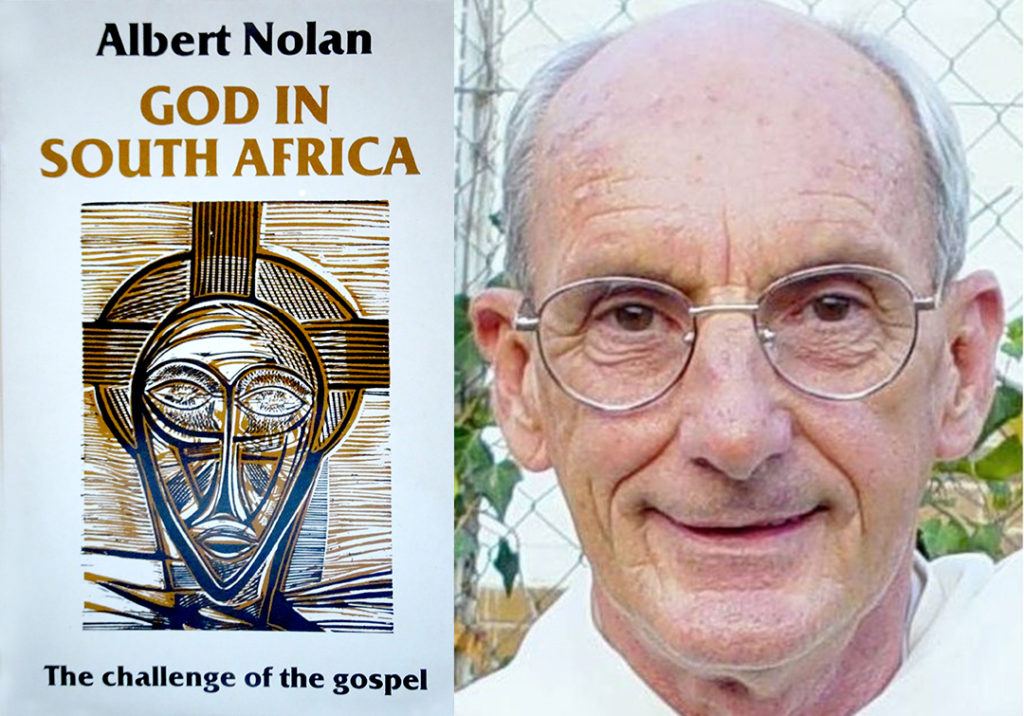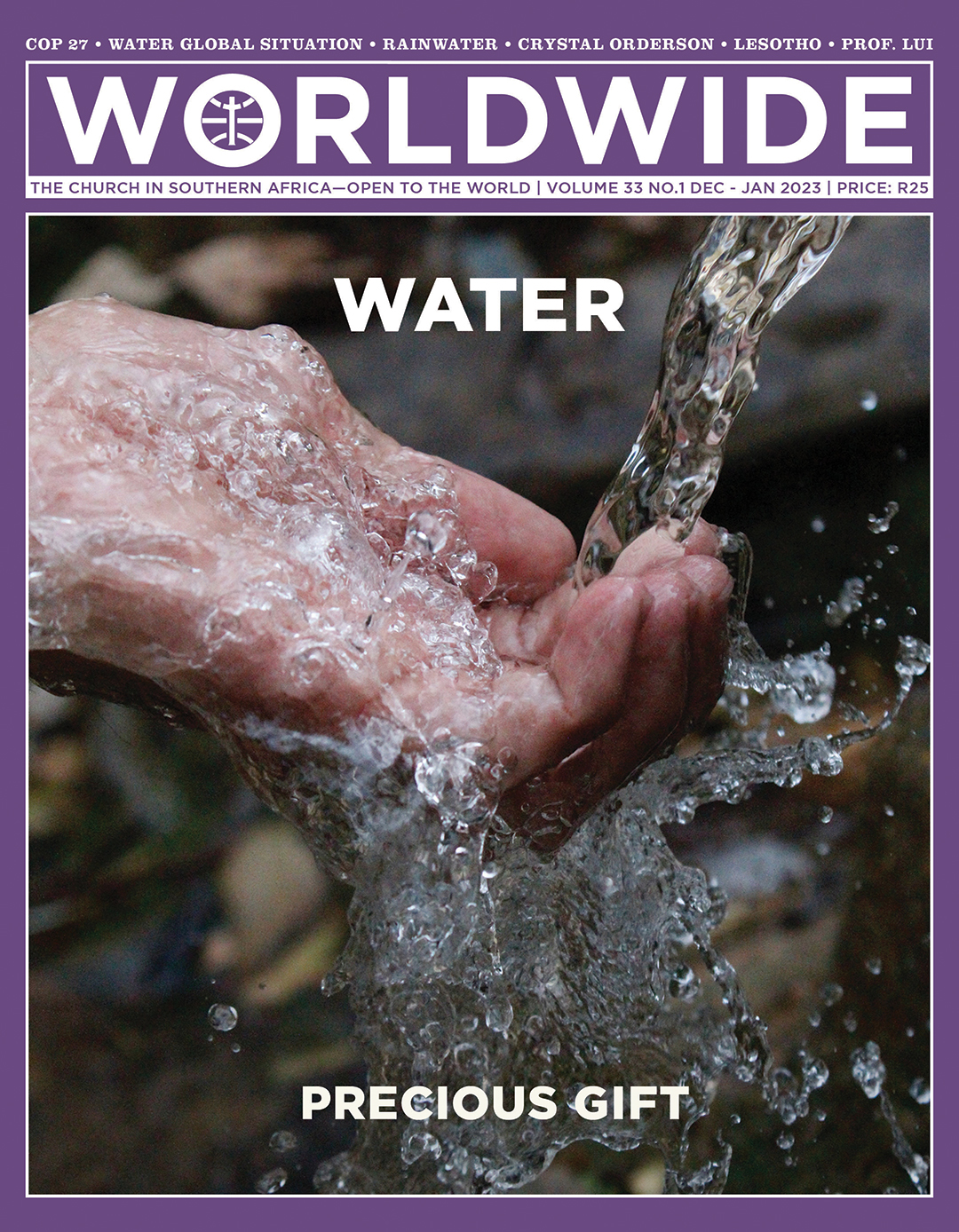MEMORIAL • FR ALBERT NOLAN

Credit: Southern Cross magazine.
A prophet of hope for today’s world
Well-known South African Catholic priest, anti-apartheid activist and internationally renowned theologian and author, Fr Albert Nolan died at the age of 88, at Marian House in Boksburg, Johannesburg on 17 October 2022. Awarded the Order of Luthuli in Silver by the then President Thabo Mbeki in 2003 for his “life-long dedication to the struggle for democracy, human rights and justice and for challenging the religious dogma, especially the theological justification for apartheid”, Nolan inspired a generation of Christian activists and theologians
BY the Worldwide team
ALBERT NOLAN was born to South African parents of Irish descent, on 2 September 1934 in Cape Town. He went to school at St Joseph’s Marist Brothers, in Rondebosch. After school, he worked for some years in a bank. He felt the call for religious life and joined the Dominican Order, motivated by their dedication to study, prayer and proclaiming the Word of God, as well as by their commitment to search for truth. He did his novitiate in 1954, and was ordained in 1961.
Shortly after his ordination, he went to study his licentiate and his Ph.D. in biblical theology in Rome. He lived there during the celebration of the Second Vatican Council. He said it was one of the most formative events of his life. He got acquainted with the new ideas coming forth. When he finished his studies in 1964, he came back to Stellenbosch, South Africa, where he worked in a parish while teaching.
Attending a conference about the New Testament in Stellenbosch, and listening to the speakers, he started feeling more and more uncomfortable; “something was amiss there”. The scholars had a philological approach, analysing each word of the Bible passages, trying to understand its meaning and relationship with other accounts in the Old Testament. Though interesting, Fr Albert had in mind a different way of approaching Scripture, rather than the scholarly way.
Like Thomas Merton, Fr Albert realised that following Christ was not just leaving the world behind, but immersing oneself fully in it, as Jesus did through His incarnation. Scriptures were powerful because they were the Word of God, alive and active. The Word of God was there to touch people’s hearts, to change them and to bring them to conversion so that they could transform the reality in which they lived. Scripture was not only for academics, but ordinary people should also be able to read the Bible and understand its significance in their lives. That made his preaching, his theology, so vibrant—it freed people to follow Christ and to be truly themselves.
As chaplain to the Catholic students at Stellenbosch University, Fr Albert passed on this great enthusiasm for Scripture. He touched students’ lives, making them aware that faith was not something for Sunday, but to be carried out in one’s daily life. Scripture wasn’t something one reads and says, ‘Oh, what lovely words; how inspiring,’ but it was there to recognise one’s dignity and authenticity as a human being, and to go out to recognise this in others.
Contrary to the ‘official ideology’ of apartheid, that whites were the special loved ones of God, and black people were second class at best, Fr Albert believed that every person, created in God’s image and likeness, was a child of God, whose dignity needed to be respected, to be upheld, and whose rights needed to be fought for. In humility, he would say: “It is not me saying this”. He never pointed to himself, but always to Jesus.
“Now is the time, the Kairos; our opportunity to change and live in a new way. Let us not delay or we might lose the chance”
In 1981, Fr Albert was reminding the Catholic students of WITS University, white South Africans, that we could not buy into the ideology of apartheid; we had to stand against it, even to the point of giving up our lives. He used to be very uncompromising in his preaching.
For him, the Gospel was not just about consolation and comfort, but also about challenge. His theological approach motivated us all—white, black, rich and poor. His first book, That man Jesus, a rewriting of the lectures to the student’s conference in 1973, was reformulated into Jesus before Christianity. The book starts with a warning: if we carry on in the direction we are travelling, we are heading for catastrophe.
Fr Albert, who participated actively in writing the Kairos document, often preached: “Now is the time, the Kairos; our opportunity to change and live in a new way. Let us not delay or we might lose the chance.”
Throughout his life, he sought to bring theology down from academic heights, closer to students, to workers, to all, especially black people, nourishing their lives. For him, theology was not just to be read, or prayed about, but to be lived. He met South American theologians, particularly Gustavo Gutiérrez, then a diocesan priest, and author of A theology of liberation who inspired him to follow his methodology of See-Judge-Act; to look at the reality (see), evaluate it and understand it in the context of the Bible (judge) and, most importantly, not to leave it at an academic level, but to act, and make a difference in the world.
See-Judge-Act became the means to follow Christ’s prophetic way. It’s not enough to write statements against injustices or to say what is wrong or right. Something needs to be done by getting involved in the reality in which we live, becoming like That man Jesus, who was concerned for the suffering of others. It implies bringing change into people’s lives which enables them to have their humanity recognised. Ideologies such as apartheid dehumanised not only the oppressed but the oppressor. Fr Albert tried to free all people from it, and to help them to live as Christ did, in a more compassionate, loving, forgiving way, and to work for social justice. He believed that Jesus didn’t die on the Cross for opposing doctrines of Judaism, but because He stood up for those who were in greatest need.
Fr Albert’s theology showed concern for the suffering of humanity. As Christians, we cannot stand aloof, but we have to do something to alleviate that suffering. His second book, God in South Africa, was an exercise of contextual theology. As a member of the Institute for Contextual Theology (ICT) in Johannesburg, he tried to develop a theology—based on See-Judge-Act—which speaks to the concrete reality of suffering and seeks to become a prophetic witness to a life-giving and transforming word. In a context where things look catastrophic, it shows that God speaks a Word of transformation to His people.
He always pointed to hope in any situation, because of his deep trust and faith in That man Jesus, and in God’s work
Fr Albert wanted to make all aware that God was active and at work in the South African context, bringing transformation. In harsh situations, we can easily lose direction, give up hope, or be in despair. His speech, after receiving the honorary title of Master of Sacred Theology in 2008, entitled Hope in an age of despair, characterised his person; he never despaired. He always pointed to hope in any situation, because of his deep trust and faith in That man Jesus, and in God’s work. He believed that God was in every situation, so there was no need to fear. Faced with catastrophe or danger, when we do something, God blesses our efforts and increases the results. God enables reality to be transformed into His handiwork, into His life-giving project for humanity, for the salvation of the world. Fr Albert had this unshakable hope in life.
Fr Albert showed what needed to be done so that one wouldn’t lose hope, giving people another opportunity and understanding the situation from another perspective. In our world today, Fr Albert’s way of living for Christ, pointing to That man Jesus, is as necessary as it was when he wrote his book. After 1994 with the decline of the rainbow nation idea, and many people on the bandwagon to get rich quickly, and to hollow out the institutions of our society, he wrote another book, Jesus today. In it, he says, “yes, we needed to change the structures of society—and that was the emphasis in the past—though perhaps not exclusively; but now, we need also a personal conversion to look at the values of the Kingdom, rather than the corrupt and selfish values of the world”.
He called us to move from the false self to a more life-giving self, the true self, as Thomas Merton called it, which can help us bring about the change that is needed, so that we can avert selfishness, corruption, and ecological devastation. When Fr Albert was asked to write his memoirs, he said: “if people want to know who I was, what I believed and what I stood for, they can read my books”. Hopefully, his words will encourage us to do so, read his books, and follow That man Jesus.
—
References
Gutiérrez, G. 1973. A theology of liberation. Orbis Books, New York.
Nolan, Fr Albert. 1976. Jesus before Christianity. Darton, Longman and Todd, London. Nolan, Fr Albert. 1988. God in South Africa.
David Philip, Cape Town & Johannesburg. Nolan, Fr Albert. 2006, Jesus today. Orbis Books, New York.
Nolan, Fr Albert. 2009. Hope in an Age of Despair: And Other Talks and Writings. Orbis Books, New York.

